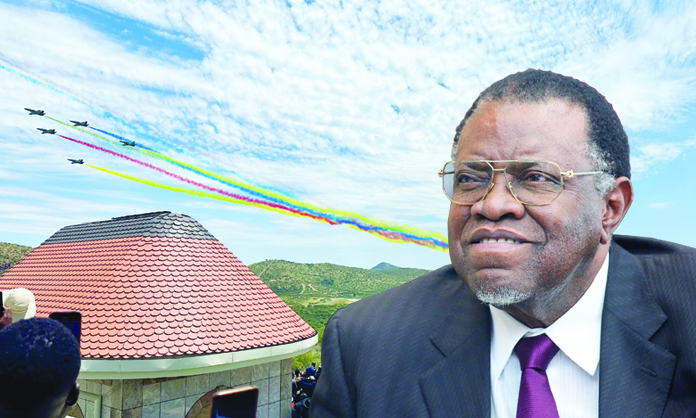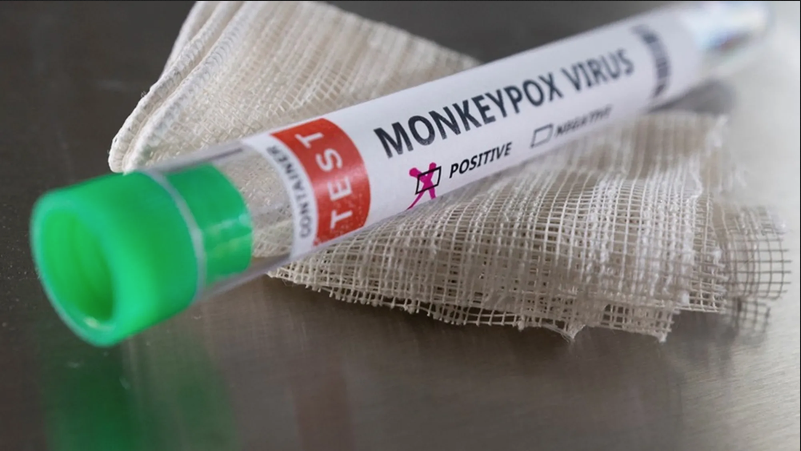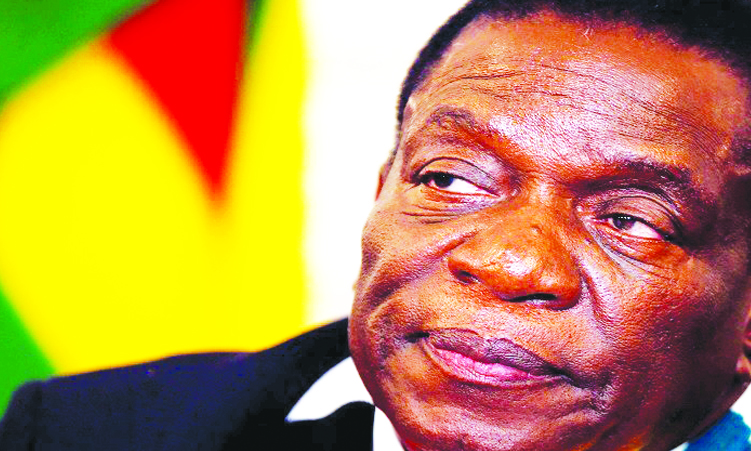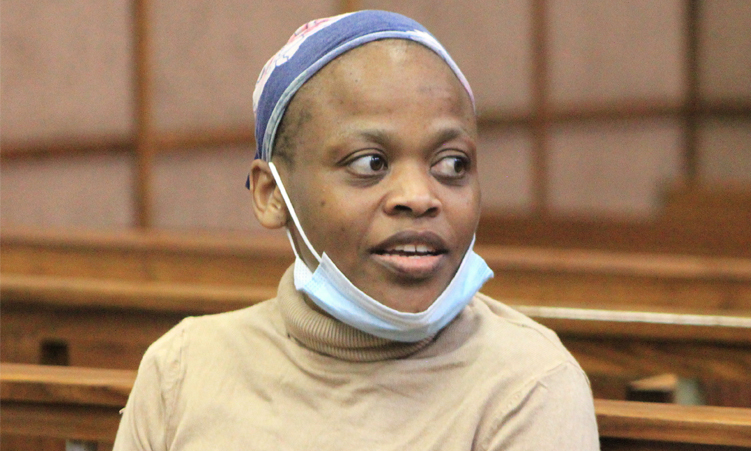‘A peasant who became president’ and touched countless hearts
Tears flowed as thousands came to say goodbye to president Hage Geingob on Friday, Saturday and Sunday.
On Friday they lined the streets of the capital to watch his body being transported on a designated before laying in state at the Parliament Gardens.
On Saturday they braved the early morning to get to buses that took them to his final memorial service at Independence Stadium.
On Sunday, Geingob’s body was finally laid to rest at Heroes’ Acre.
His widow, Monica Geingos, referred to him as “Ou Hageba, kai axaba”, meaning “Ou Hage, grootseun” in Afrikaans and loosely translated to Old Hage, big son in English.
In the end, it was a true outpouring of love and affection for Ou Hageba, kai axaba.
Among those who wept on Friday was Elfrieda Temba.
“It is not all about the pension social grant […] we are mourning because of the humility and love he had for us,” she said.
Loide Tjiramba (27) held up a poster that said “Forever in our hearts” as she got on to a bus at Malakadraai to go to Independence Stadium on Saturday.
“Anything else can wait, my president comes first. I wouldn’t miss this day, I voted for him for president, and I made sure to also attend his burial and pay my last respects,” she said.
Ueriseri Murumbua got up at 05h00 to wait for the municipal bus at the Independence Arena pick-up point on Saturday.
Artist Kaipurua Katjaita from Okakarara arrived in Windhoek on Wednesday already to attend the funeral.
He held a portrait of Geingob with the words ‘Son of the soil, freedom fighter and more’.
Katjaita kept holding his painting throughout Geingob’s funeral.
MARKED FOR GREATNESS
On Saturday during the official memorial service at Independence Stadium, president Nangolo Mbumba told mourners Geingob’s path was marked for greatness.
Mbumba said the solidarity demonstrated by global leaders attending the event reaffirmed Geingob’s principle that “Namibia is a friend to all and enemy to none”.
“President Hage Geingob was destined for greatness. He showed us how to persevere,” Mbumba said.
He described Geingob as a man of peace and recited his favourite dictum: “One does not make peace with your friend, one makes peace with your enemy.”
He said the late president lived with honesty and stayed true to his values, despite the challenges he faced.
Mbumba said there were many instances where president Geingob’s pan-Africanism came to the forefront.
“At the African Union, he championed the cause of Africa,” he said.
The president said Geingob got his principles from his father, Hans.
He added that Geingob was brought up in a multi-ethnic environment which provided the perfect setting for moulding his stance against oppression under apartheid.
“We will ensure that the policies of president Geingob will achieve their purpose,” Mbumba vowed.
FROM POVERTY TO PRESIDENCY
Geingos in a tribute on Saturday said she was proud that the boy who was born under a tree in the Grootfontein area is now respected worldwide.
“Hage connected easily to people. You were born a peasant and died a president,” she said.
“In his death, Hage truly came alive,” Geingos said.
She said after his death Namibians from all walks of life came together and mourned.
Geingos also said her husband walked in the true meaning of his middle name, Gottfried, which means “God’s friend”.
Since his early days of being a teacher, Geingob has been in a position of power, but always remained humble, she said.
“My husband was an honest man,” she said.
During his tribute on Saturday, former president Hifikepunye Pohamba said he had known Geingob for more than 60 years.
“We met for the first time at a bus stop at a railway station at Tsumeb in December 1962. On that day, comrade Eliander Mwatale and I were being deported to our native homeland [Ovamboland] upon our release from imprisonment that lasted for several months.
“We were imprisoned for being out of the country without permission,” he said.
CULTURAL RITUALS
Hundreds witnessed the final overnight vigil on Saturday and Sunday, comprising hymns and customary ≠Nukhoe rituals led by chief Ignatius Gaoro Kavango and traditionalist Rosa Namises.
At 04h00 the two performed the //Gau!amus followed by the //Goa≠hobos at 06h00 before the body was transported to Heroes’ Acre to be buried.
On Sunday at 02h00, Geingos returned to Independence Stadium, where her husband’s body was lying in state, to spend a few more precious hours with him.
She was surrounded by elderly Damara women and only left the stadium at 06h00.
Kavango explained why the mourners spent the night at the stadium.
“We came together as per our culture to bid farewell in a form of vigil. According to the culture of the ≠Nukhoe people, a deceased person is not left alone the night before his body is laid to rest,” he said.
Namises and town crier Hans Axasi #Eichab performed rituals, which included blowing a kudu horn and speaking to the ancestors.
“She came and sat there with the night vigil next to the casket, and that is the appropriate way it is done,” Namises said.
She, however, expressed her disappointment over the sidelining of cultural elements throughout the weekend’s events.
Traditional activities are of significance in maintaining cultural identity and providing solace to the bereaved, she said.
Namises highlighted the role of cultural rituals in connecting individuals to their ancestry and spiritual beliefs.
These rituals, she said, were sneaked into the memorial and funeral service programme, since they were overshadowed by religion and diplomacy.
“We had to find our own ways to reach the first lady […] It’s not a secret thing. It’s not a poisonous thing. It is an open cultural practice […] and it is a real standing practice,” she said.
Namises said she noticed mourners leaving the burial site without washing their hands, which is normal practice among the different tribes.
The practice is said to signify the symbolic removal of death and transition to normal life after mourning.
“Many aspects that are important to our people were not recognised,” she said.
Namises said Geingos was not adequately supported during the mourning process and was not surrounded by elderly women to comfort and provide her with guidance enough.
She emphasised the need for collaboration between the state, the church and cultural communities.
During her tribute on Saturday, Geingos said her husband told his family of his preferences for when he dies.
“Hage’s transparency has helped us in more ways than one, because he spoke to us so often about his preferences regarding his legacy and expectations from us as his immediate family,” she said.
Geingos said this “transparency” helped the family to plan his funeral.
“It was easy to reach consensus on key decisions,” she said.
“I was at his side, shocked to the deepest part of my core that someone so full of life, so full of love, had just taken his last breath. Death will humble you.
“Hage’s passing is a reminder to all of us to be prepared.
“I want to thank my blended family and extended relatives of the Geingob family for passing this very difficult relationship test,” she said.
Geingos then bid her husband farewell.
“Ou Hageba, kai axaba.
“You defined love, you were loved by all of us and nothing will ever be the same without you.
“The people’s president, my president, my husband, my best friend, you were born a peasant and died a president. Rest in power.”
The former first lady also spoke about Geingob’s last few weeks.
“Hage and I were informed by doctors on 16 January 2024 that he had cancer, after a biopsy. We went to our first oncology visit on the 17th of January to devise a treatment plan and on 18 January he insisted on releasing a press statement notifying the public that he had cancer,” Geingos said
She said Geingob did not know how long he had to live.
“His passing was traumatising and unexpected. He was eager to retire, we had such plans and true to his word he didn’t overstay,” she said.
And on Sunday, as revered bishop Sageus |Keib of the Evangelical Lutheran Church took to the podium at Heroes’ Acre to deliver a prayer and scripture reading, the end was finally in sight for mourners to accompany Geingob’s body to its final resting place.
As if reading the mood of a nation that had mourned and wept, Keib said as he read John 14 verses 1-4: “Do not let your hearts be troubled.
“You believe in God; believe also in me. My Father’s house has many rooms; if that were not so, would I have told you that I am going there to prepare a place for you?
“And if I go and prepare a place for you, I will come back and take you to be with me so that you also may be where I am. You know the way to the place where I am going.”
Stay informed with The Namibian – your source for credible journalism. Get in-depth reporting and opinions for
only N$85 a month. Invest in journalism, invest in democracy –
Subscribe Now!






